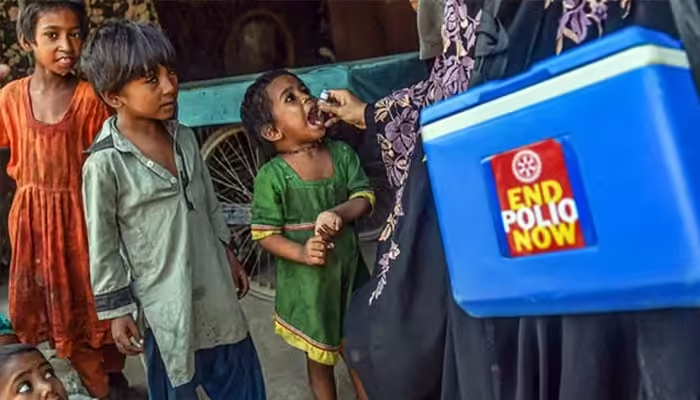Islamabad: The battle against polio in Pakistan continues to face serious challenges as four new cases of the crippling disease have been reported. These cases were detected in various districts, including Jacobabad, Karachi, and Dera Ismail Khan. The new infections have raised the total number of polio cases in the country to 32 this year, sparking renewed concerns among health authorities and international experts.
Details of the New Cases
The newly reported cases include two children from the Tuhl tehsil of Jacobabad district, where a 32-month-old girl and an 18-month-old boy were diagnosed with the polio virus. Meanwhile, in the Bin Qasim tehsil of Karachi’s Malir district, a 72-month-old child was also found to be infected with the virus. In Dera Ismail Khan, a 22-month-old child has contracted polio, adding to the rising number of affected children in the country.
The steady increase in polio cases is a worrying trend for a nation that has been striving to eradicate the disease for decades. Despite ongoing vaccination efforts and government-led initiatives, the polio virus continues to pose a significant threat to public health, particularly among children in remote and underprivileged areas.
Rising Polio Cases in Pakistan: A Grim Reality
This year alone, Pakistan has reported 32 cases of polio, which highlights the country’s vulnerability to this debilitating disease. Experts predict that the situation could worsen in the coming months. According to health officials, the number of polio-affected children may rise to between 55 and 65 by the end of the year, given the current trend.
The recurrence of polio cases in the country has raised alarms among healthcare professionals, both locally and internationally. Pakistani authorities, in collaboration with international health organizations like the World Health Organization (WHO) and UNICEF, have been working tirelessly to combat polio. However, the recent surge in cases suggests that there are still significant gaps in the country’s polio eradication efforts.
Challenges in Eradicating Polio
Several factors contribute to the persistence of polio in Pakistan, despite extensive vaccination drives and awareness campaigns. One of the main challenges is the geographical and socio-political landscape of the country. Remote and conflict-ridden areas, such as parts of Khyber Pakhtunkhwa and Balochistan, are difficult for vaccination teams to access. This limits the reach of immunization programs, leaving many children unvaccinated and vulnerable to the virus.
Misinformation and vaccine hesitancy also remain major hurdles. Some communities are still reluctant to accept polio vaccinations due to myths and misconceptions about the safety and efficacy of the vaccine. These fears, often fueled by rumors, hinder the success of the nationwide polio eradication campaign.
Moreover, the country’s struggling healthcare infrastructure, particularly in rural and underdeveloped areas, makes it difficult to detect and respond to new cases of polio in a timely manner. A lack of proper sanitation and hygiene further exacerbates the spread of the virus, as polio is transmitted through contaminated water and poor hygiene practices.
Government and International Efforts to Curb Polio
Despite these challenges, the Pakistani government, along with its international partners, has made significant strides in reducing the prevalence of polio over the years. Numerous vaccination campaigns are conducted annually, targeting children under the age of five, who are most vulnerable to the virus. Mobile vaccination teams are deployed to reach even the most remote areas, ensuring that as many children as possible are immunized.
International organizations such as WHO and UNICEF have been instrumental in supporting Pakistan’s polio eradication efforts. These organizations provide financial aid, technical expertise, and on-ground support to strengthen the country’s immunization infrastructure. Additionally, public health awareness campaigns are regularly launched to educate communities about the importance of vaccination and dispel myths surrounding the polio vaccine.
However, the resurgence of polio cases indicates that there is still much work to be done. Health experts are calling for stronger measures to address the ongoing challenges in the fight against polio. This includes improving access to vaccination in hard-to-reach areas, combating misinformation, and enhancing surveillance to detect and respond to new cases more effectively.
The Path Forward
The rising number of polio cases in Pakistan serves as a stark reminder of the importance of continued vigilance and commitment to eradicating the disease. While the country has made commendable progress in reducing the incidence of polio over the years, the recent surge in cases highlights the need for sustained efforts.
Health authorities must strengthen their efforts to reach vulnerable populations and ensure that every child receives the polio vaccine. At the same time, community engagement is crucial to overcoming vaccine hesitancy and building trust in the safety and effectiveness of the vaccine.
The eradication of polio is not only a national priority but also a global one. The success of Pakistan’s polio eradication campaign will play a critical role in the global fight against the disease. With renewed focus, collaboration, and determination, Pakistan can achieve its goal of becoming a polio-free country, ensuring a healthier and safer future for its children.
The recent reporting of four new polio cases in Pakistan highlights the ongoing challenges the country faces in its fight against the virus. With a rising number of infected children and concerns about further outbreaks, it is more important than ever for the government and international partners to intensify their efforts to eradicate polio once and for all. By addressing key challenges such as access to vaccinations, misinformation, and inadequate healthcare infrastructure, Pakistan can move closer to its goal of becoming polio-free.



